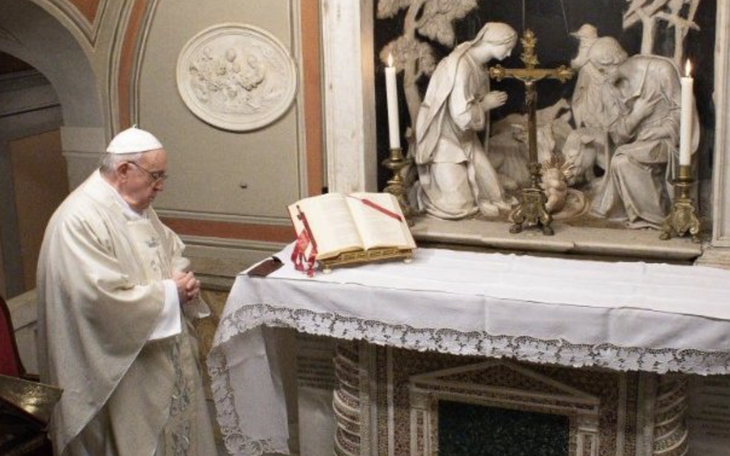Pope Francis lived a simple life, leaving only $100 in assets after his death.5
Refusing to receive a salary, refusing to live in the villa in the Apostolic Palace, refusing to drive luxury cars, using expensive clothes and jewelry, Pope Francis lived a simple life until his death.
Portrait of Pope Francis at the interfaith mass at the Buenos Aires Cathedral, Argentina on April 22 – Photo: AFP
The Argentine newspaper Ámbito , citing information on the net worth of celebrities and influential people in the world, recently reported that Pope Francis left behind only $100 worth of assets after his death at the age of 88 on April 21.
The father of the Catholic Church has not received any salary since becoming pope in March 2013. The average salary of a cardinal is known to be between $4,700 and $5,900 per month.
Even after being made a cardinal in 2001, he still lived in a small apartment and used public transportation such as buses or subways instead of luxury cars with private drivers or personal security teams reserved for cardinals to preserve the spirit of poverty, in obedience to the vow of “poverty” that he promised to the Jesuits.
The Good Shepherd, Poor Shepherd of the Lord
In the memories of the poor people in Buenos Aires, especially in the largest slum of the capital of Argentina, Villa 21-24, Pope Francis, then priest Jorge Mario Bergoglio, will forever be the “priest of the poor”, the father who always loved and helped those on the fringes of society.
Pope Francis, then Cardinal Bergoglio, rides the subway in Buenos Aires in 2008 – Photo: REUTERS
“He came here and kissed our feet, the feet of our people. That means everything to us,” Aida Bogarin, 44, a resident of Buenos Aires, told the Guardian .
“He walked around the area, listened to our concerns, and that helped us a lot. I remember him eating here.
“He ate Chipas (an Argentine cheese bread) and shared cups of Maté (a traditional South American tea),” said chef Juan Ramón Congo, 60, at the Virgen de los Milagros de Caacupé parish in the Villa 21-24 area.
Cardinal Bergoglio washed and kissed the feet of poor and drug-addicted people in Buenos Aires on Holy Thursday 2008 – Photo: ENRIQUE GARCIA MEDINA
“The people of Villa 21-24 have always felt marginalized, despised and abandoned. But his presence and the way he treated them gave dignity to the poor,” said Father Lorenzo de Vedia (known as Father Toto), who met Pope Francis as a young priest, describing Pope Francis’ frequent visits to the slums.
Father Toto added that Pope Francis not only celebrates Mass in the poor areas, but also stays after Mass to listen to people’s stories and that he doesn’t just talk, he always acts. “He washes and kisses people’s feet,” Father Vedia told the Guardian .
Pope Francis has repaired the roof of a sports center in Buenos Aires after a hurricane, supported the families of victims killed in another hurricane when insurance did not cover it, and helped addicts recover from their addictions and rehabilitate.
“But why don’t you go home?”
Despite his closeness and love for the people of Argentina, Pope Francis has never visited his homeland since becoming Pope. This is also the reason why the Argentine people still feel uneasy about it to this day.
“To be honest, I don’t like the fact that he never returned to Argentina,” Laura Aguirre, 50, of Argentina, told the New York Times after attending a memorial Mass for Pope Francis on April 21.
Guillermo Oliveri, the Argentine government’s secretary for religious affairs for decades, said the question of why Pope Francis has not visited Argentina is “the million-dollar question.”
Many experts speculate that the reason Pope Francis has visited nearly 70 countries and territories in his 12 years in office, but has not returned to Argentina is because he does not want to get involved in politics, even though many presidents and Catholic leaders of this South American country have invited him dozens of times.
“He doesn’t want any president to put on his robe and proudly say, ‘I’m the one who brought the pope,’” said Sebastián Morales, 37.
According to observers, another reason may stem from the conflict between the Argentine government and Pope Francis since he was the archbishop of the Buenos Aires Diocese over a number of policies such as legalizing same-sex marriage or legalizing abortion (in 2020).
However, Pope Francis once revealed that he planned to visit Argentina as part of his trip to Chile in 2017, but was ultimately unable to return home due to scheduling iss




